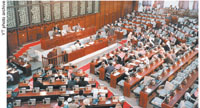
New parliamentary respite to seek lost parties agreementAl-Naqeeb: “No dialogue between GPC, JMP about election committee” [Archives:2008/1169/Front Page]
July 3 2008
 |
For The Yemen Times
SANA'A, July 2 ) Parliament last Tuesday approved suspending discussion on a project to amend a law regarding the Supreme Commission for Elections and Referendum in order to achieve political agreement between Yemen's main parties within the formation of such committee.
The government proposed a project last November to amend the election law to stipulate that committee members be judges, which caused reservations within the Joint Meeting Parties, who demanded the committee be comprised of politicians, based upon party-agreed principles. However, the ruling General People's Congress suggests the committee be formed in accordance with the number of voters in the April 2003 parliamentary elections.
The state-run Saba News Agency reports that the Yemeni Parliament – in which the GPC holds 229 out of 301 seats – approved suspending discussion of the project to amend the public election law “out of its belief regarding the importance of political agreement and achieving the nation's supreme interests, as the involved parties and political organizations continue the process of political dialog.”
It also pointed out that Parliament expressed its sorrow at the absence of JMP parliamentary bloc members from Parliament sessions, claiming they changed their decision regarding boycotting Parliament.
JMP parliamentary bloc members have been boycotting such sessions since June 9 in protest against the amendment project's placement on Parliament's schedule.
Aidaroos Al-Naqeeb, head of the Yemeni Socialist Party's parliamentary bloc, says Parliament's endorsement of suspending discussions about the election law amendment project comes within the context of the national relationships between the political parties, noting that the JMP parliamentary blocs clarified their reasons for boycotting the sessions in a previous press release sent to the speaker of Parliament.
Al-Naqeeb maintains that the JMP will state its attitude next Wednesday toward Parliament's decision to suspend discussions about the elections.
Regarding news of current dialogue between the JMP and the GPC related to forming the election committee, Al-Naqeeb denies any such dialogue. “I don't have any information about a dialogue or any discussion between the JMP and the GPC regarding forming the election committee,” he said, at the same time warning that the “election committee might turn to be a political crisis.”
He added that, “The GPC had to find a convenient background for dialogue with the parties about the constitutional amendment,” further demanding that “a credible electoral environment should be provided in which to hold the upcoming April 2009 parliamentary elections.”
SCER Secretary-General Sha'if Al-Hussaini recently declared that the continuing disagreement between the parties about the committee until late June “means adjourning the next parliamentary elections.”
For its part, the International Association for Voting Systems indicates that, “Since a Supreme Election Committee wasn't formed and declared last March, this increases the potential for hindering preparations for the upcoming parliamentary elections.”
Since the SCER's legal period ended last November, the political parties have failed to reach an agreement on how to form the sixth election committee.
The first election committee was formed in August 1992 and included 17 members headed by Judge Abdulkarim Al-Arashi, while the second seven-member committee was formed in July 1993, chaired by Muhsen Al-Ulofi.
The third committee was formed in November 1997 and headed by Abdullah Barakat. Alawi Al-Attas was head of the same election committee in 1999, which included seven members.
Also including seven members, the fourth election committee was formed in 2001, headed by Khalid Al-Sharif.
Parliament approved adding two more members to the Supreme Committee in June 2006, thereby increasing its number to nine, according to agreed principles between the GPC and the JMP.
——
[archive-e:1169-v:16-y:2008-d:2008-07-03-p:front]


